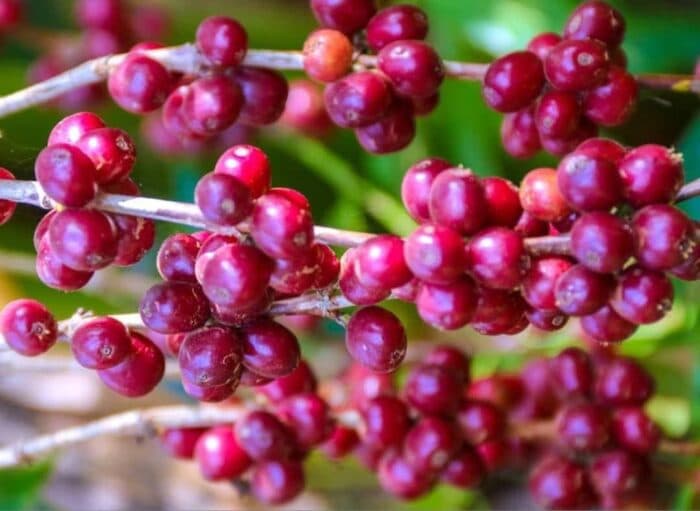In March, I experienced one of those moments. We had just hired a new research scientist, a breeder named Robert Kawuki. I knew Robert as a researcher par excellence; a man who had helped orchestrate the modernization of one of Uganda’s most important food crop breeding programs—cassava—and had earned international respect for his work. We felt lucky to have hired him to join our growing coffee breeding team, which, in 2023 and 2024, is laying the foundation for the dawn of new opportunities for our industry.
Innovation allows us to define the world we want to live in and to use science as a tool to get us there.
What I hadn’t expected was to find myself in a conversation with Robert, a soft-spoken expert on cassava, learning about how his journey to coffee really began 85 years ago in a small rural village in Uganda called Kiryowa. Robert told me about how his grandfather, Ssalongo Paulo Kisalale Lukwago, then a farmer and agricultural officer at the Kawanda Agricultural Research Station in Uganda’s Wakiso District, foresaw the economic opportunity that coffee afforded families like his. He planted coffee trees and encouraged others to do so. Those trees, planted in rich Ugandan soil in 1938, partly paid for Robert’s education together with other grandchildren, especially during the times when civil strife and unemployment were hitting many families hard. Uninterrupted education paved the way for Robert to complete school and go on to become a renowned global scientist. In his grandfather’s words: “Coffee paid for your parents’ schooling and now your own. We should strive to keep this life possible and improve upon it.”
The story Robert shared with me was a profound reminder that both coffee and science have generational impacts—and that our work is inherently optimistic and forward-looking. Creating better coffee varieties gives farmers choices, fills consumers’ cups with joy, and creates the foundation for flourishing and sustainable coffee businesses for generations to come. In short, innovation allows us to define the world we want to live in and to use science as a tool to get us there.
In 2023, we continued our work to drive science-based solutions for coffee agriculture, with strong backing and support from WCR member companies and our research partners around the world. Heading into the new year, I am pleased to reflect upon the progress WCR has achieved in 2023 and some of what we have to look forward to over the next few months. Here are some our highlights from this year:
- Implementing the Innovea Global Breeding Network with 9 national partners, including germination of seeds around the world and capacity-building with national partners through learning journeys in the USA and Vietnam.
- Releasing a new arabica DNA fingerprinting tool for commercial availability, which dramatically reduces the cost of variety identification and genetic traceability for quality assurance in renovation projects. This tool has been used to clean up the seed supply from 22 seed lots in Latin America, assuring that high-quality, genetically conforming planting material will be available to nurseries across the region next year.
- Laying the foundation for a Robusta Breeding Network, including the launch of the Robusta Variety Catalog, publication of Grafting Manual and Nursery Videos, Quality Focus Group, and AbacusBio landscape analysis.
- Confirming the strong commitment of our member companies to securing the future of coffee today and for generations to come, as evidenced by this fantastic video of some of our board members discussing why they believe in the power of agriculture R&D to transform coffee.
These are thrilling successes. At the same time, we also know that innovation requires intensified investment to catalyze positive change at scale. In 2023, we quantified coffee’s innovation investment gap. It’s no surprise the gap is large—our crop requires $452 million USD/year over the coming decade to sustain production in the face of the climate crisis. So we must think differently. We need the coffee industry to redouble its commitment to agricultural innovation, and for its leaders to become champions who advocate for greater investment of public sector funds for key origins including Ethiopia and priority research needs, like developing global tools to support faster, better, and more affordable coffee breeding.
In 2024, we look forward to building on the momentum we gained over the last year. Through commitments from our member companies and new U.S. government funding, WCR’s revenue will grow 36% in 2024, enabling us to launch a global robusta breeding network that will make hundreds of new robusta crosses, transforming the opportunities for robusta farmers like Robert’s grandfather.
In addition, we will continue our work to ensure that the Innovea global breeding network can deliver climate-resilient, high-quality arabica varieties and that high-volume nurseries in Latin America and Uganda can sell healthy, genetically conforming trees. We are also excited next year about a partnership with the International Center for Tropical Agriculture (CIAT) that will allow us to combine data from the world’s largest coffee variety trial, WCR’s International Multilocation Variety Trial (IMLVT) network, with CIAT’s climate modeling data to make for the first time best-bet, climate-resilient variety recommendations for farmers and industry for the first time.
But our work doesn’t stop with research. While Robert and the rest of our world-class breeding and R&D team are working on all this, my priority is to engage industry and governments in Europe, Japan, Canada, and the U.S. to close coffee’s $452 million USD/year investment gap.
As I look ahead to the transformational impact that our programs are poised to have on coffee production worldwide in the coming decades, I can’t imagine a more fitting way to honor the wish of Robert’s grandfather and millions of coffee producers worldwide—to “keep this life possible.”


